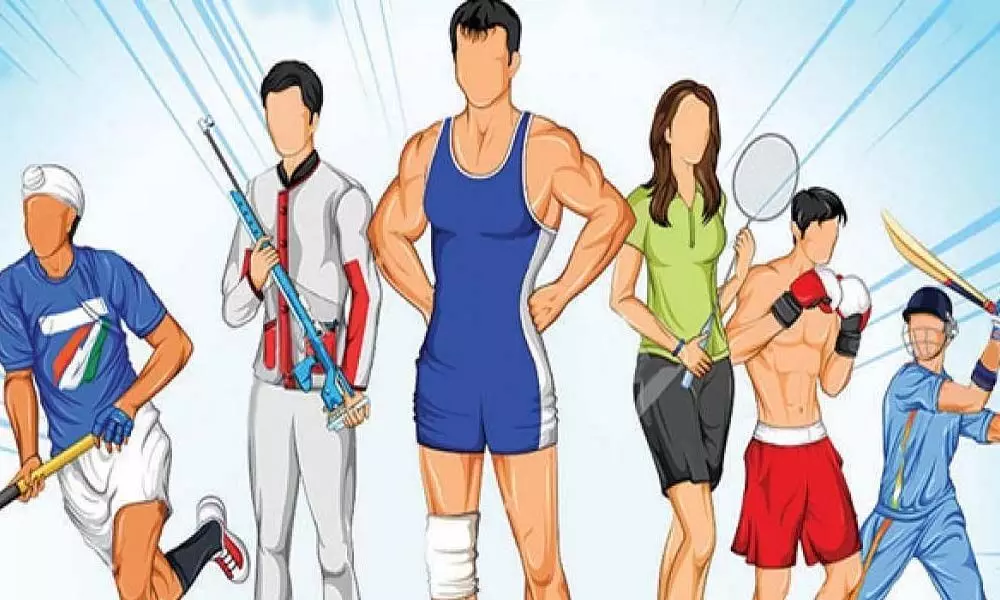Why sports in India don't get its worthy space?
Sports in Indian society are barely treated with respect in an everyday sense and this error has to be corrected
image for illustrative purpose

With the Tokyo Olympics unfolding against a world battling Covid-19, the life-affirming potential of sports is more discernible than ever. The games are a refusal to bow down to disasters and an emblem of resilience and human continuity and as Chanu Saikhom Mirabai and Lovlina Borgohain clinch the first medals for India this time, it is time for us to acknowledge the national pride and human spiritedness sports accrue to us. Accordingly, it is time to give sports its due and make a worthy space for it in our mainstream education and national imagination.
A study by Puma indicates that 57 per cent of India hasn't played a sport even once in the last 12 months and less than 2 per cent of the Indian population participates in Sports. If these numbers are concerning, we need to start thinking from a societal-legal perspective. Participating in sports has been traditionally discouraged as it has been seen as a distraction from endorsed academic and professional pursuits. Sports are barely treated with respect in an everyday sense and this error has to be corrected. Constitutionally, sports are a part of Entry 33 of the State List, under Article 246 of the Seventh Schedule of the Constitution of India. Sports are clubbed together with entertainment, cinematic performances and amusement. This is perhaps where we need to inaugurate change - sports is and constitutionally deserves to be a category of its own, requiring provisions and state support for its own particularities. A constitutional shift is likely to invigorate other beneficial developments, such as budgetary allocations and discussions on sports alone, giving it the space it truly warrants. With a transformation in the way the nation imagines sports, the education system will be likely to accommodate more discourses about the same.
Physical education needs to be seriously ingrained in our curricula for appropriate focus on physical activity and training. This would need greater infrastructural development and employment of skilled professionals as coaches and trainers, alongside making physical education a compulsory part of evaluations in school. Introducing the youth to the physical benefits of sports alongside its cultural significance would facilitate a demand for better opportunities and compensations for sportspersons across the board and sports would be seen as an everyday necessity, a career alternative and something worth sustaining to keep our society going. Scholarships and other incentives can prove particularly beneficial in this regard.
Emphasising the importance of sports is also a measure to globalize the youth as the sports industry across the world brings together nations and emblematizes cultural wealth. A $756 billion industry, it offers an opportunity to generate employment and revenue as with the push towards physical education, sportspersons shall find an increasing employability. Furthermore, this will be matched by an increase in demand for sports equipment, creating greater revenue. More income can be created through the broadcasting of sports events and tournaments which shall take place with increased emphasis on sports and training and all-in-all, we are eyeing a virtuous cycle of financial gain for all stakeholders.
All of these steps will also be a step in the direction to give our sportspersons the respect they deserve. While cricketers enjoy tremendous fanfare in the country, an increased engagement with sports would make sure that athletes from all provenances get to avail the applause and opportunities they are worthy of. For instance, as India sends its biggest ever contingent to the Olympics this year, the athletes deserve our wholehearted and unconditional support and such support can be built through increasing awareness about the significance of the field. This would also bolster the opportunities available to emerging sports stars and grassroots-level athletes.
With increased levels of mental health trouble amidst the pandemic, sports can be an effective counterweight to mental distress. As several studies have proven, sports combats stress, helps fight depression and provides recreation, all of which can be crucial in sustaining mental well-being. Simultaneously, it is an experiential process which strengthens personality through teaching teamwork, leadership, self-discipline, decision-making, adaptability and independence and prepares people for life itself, with the playground being an inaugural domain for several challenges and productive lessons.
It is time for the country to envisage what sports can do for our national pride, individual and collective well-being and the economy. Accordingly, educational, legal and social change to sharpen our serious engagement with sports are needed and we must drive the change as we cheer for athletes who bring us honour and pave the way for a future of increased glory and respect for sports and the country.
(The author is Founder, Upsurge Global, and Senior Advisor, Telangana State Innovation Council)

